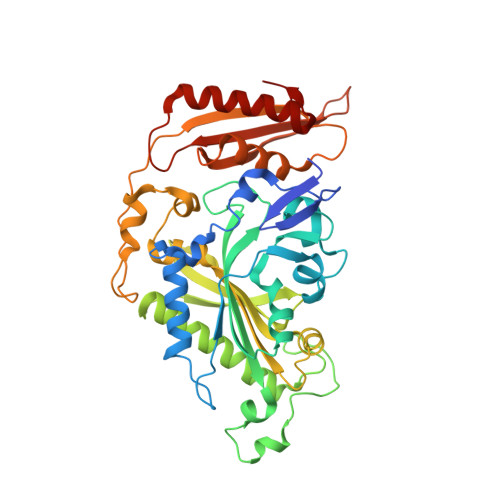Clinical and molecular characterization of novel FARS2 variants causing neonatal mitochondrial disease.
Chen, W., Rehsi, P., Thompson, K., Yeo, M., Stals, K., He, L., Schimmel, P., Chrzanowska-Lightowlers, Z.M.A., Wakeling, E., Taylor, R.W., Kuhle, B.(2023) Mol Genet Metab 140: 107657-107657
- PubMed: 37523899
- DOI: https://doi.org/10.1016/j.ymgme.2023.107657
- Primary Citation of Related Structures:
8P8X - PubMed Abstract:
FARS2 encodes the mitochondrial phenylalanyl-tRNA synthetase (mtPheRS), which is essential for charging mitochondrial (mt-) tRNA Phe with phenylalanine for use in intramitochondrial translation. Many biallelic, pathogenic FARS2 variants have been described previously, which are mostly associated with two distinct clinical phenotypes; an early onset epileptic mitochondrial encephalomyopathy or a later onset spastic paraplegia. In this study, we report on a patient who presented at 3 weeks of age with tachypnoea and poor feeding, which progressed to severe metabolic decompensation with lactic acidosis and seizure activity followed by death at 9 weeks of age. Rapid trio whole exome sequencing identified compound heterozygous FARS2 variants including a pathogenic exon 2 deletion on one allele and a rare missense variant (c.593G > T, p.(Arg198Leu)) on the other allele, necessitating further work to aid variant classification. Assessment of patient fibroblasts demonstrated severely decreased steady-state levels of mtPheRS, but no obvious defect in any components of the oxidative phosphorylation system. To investigate the potential pathogenicity of the missense variant, we determined its high-resolution crystal structure, demonstrating a local structural destabilization in the catalytic domain. Moreover, the R198L mutation reduced the thermal stability and impaired the enzymatic activity of mtPheRS due to a lower binding affinity for tRNA Phe and a slower turnover rate. Together these data confirm the pathogenicity of this FARS2 variant in causing early-onset mitochondrial epilepsy.
Organizational Affiliation:
Department of Molecular Medicine, The Scripps Research Institute, La Jolla, CA 92037, USA.















